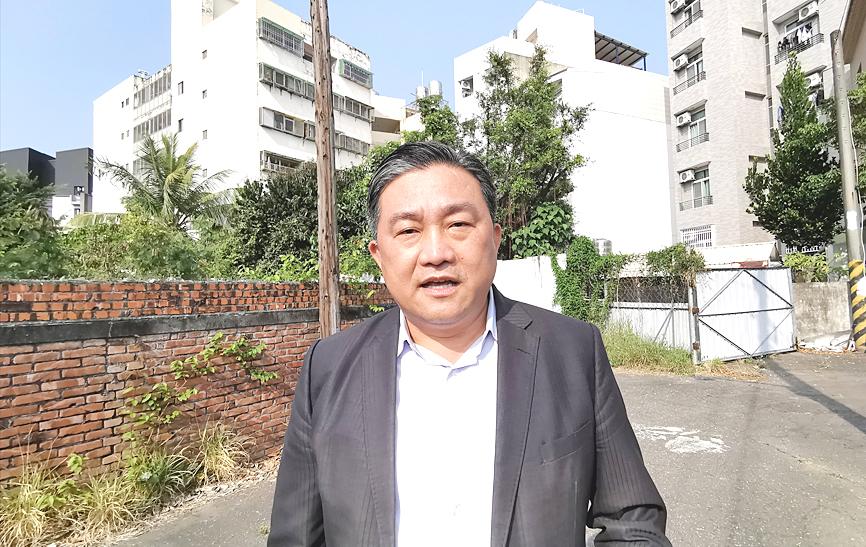National security officials have recommended criminalizing the display of the five-star People’s Republic of China (PRC) flag under social order law, as legislators deliberate an amendment that would consider the act a national security offense.
A bill proposed by Democratic Progressive Party Legislator Wang Ting-yu (王定宇) and supported by 29 other lawmakers would amend the National Security Act (國家安全法) to ban actions that damage national identity or work in favor of a hostile foreign power.
Those found guilty could be fined NT$10,000 to NT$100,000, and related articles would be confiscated.

Photo: Wu Chun-feng, Taipei Times
It would also include fines of up to NT$50,000 for “raising, lowering, hanging, displaying, holding or brandishing” any political or military flag of a hostile foreign power in public places.
However, the rules would not apply to events that have been given approval to fly such flags by a competent authority or when they are flown to accord with international convention.
The PRC flag problem has existed for a long time, but amending national security law is not the appropriate way to impose criminal liability for contraventions of “national identity,” security officials said.
They instead recommended changing the Social Order Maintenance Act (社會秩序維護法) to legislate against such acts, with fines of NT$10,000 to NT$50,000.
The National Security Act covers serious felonies, an official said, adding that it is not suitable for criminalizing the display of a flag.
If law enforcement officials have trouble determining whether something is in contravention of national security law, they could be criticized for running a police state, they said.
On the other hand, if the issue continues to be ignored, it would allow China to keep using the nation’s democratic principles for its own “united front” work, they added.
After reviewing the proposal, the official recommended applying a minor punishment.
The issue is ultimately one of social order, as seeing the PRC flag causes discomfort to many Taiwanese and could lead to violent conflict, the official said.
The National Security Council has reportedly already suggested that the Anti-infiltration Act (反滲透法) be amended to criminalize the sharing of political propaganda or misinformation under the instruction or assistance of a foreign power.

‘DENIAL DEFENSE’: The US would increase its military presence with uncrewed ships, and submarines, while boosting defense in the Indo-Pacific, a Pete Hegseth memo said The US is reorienting its military strategy to focus primarily on deterring a potential Chinese invasion of Taiwan, a memo signed by US Secretary of Defense Pete Hegseth showed. The memo also called on Taiwan to increase its defense spending. The document, known as the “Interim National Defense Strategic Guidance,” was distributed this month and detailed the national defense plans of US President Donald Trump’s administration, an article in the Washington Post said on Saturday. It outlines how the US can prepare for a potential war with China and defend itself from threats in the “near abroad,” including Greenland and the Panama

The High Prosecutors’ Office yesterday withdrew an appeal against the acquittal of a former bank manager 22 years after his death, marking Taiwan’s first instance of prosecutors rendering posthumous justice to a wrongfully convicted defendant. Chu Ching-en (諸慶恩) — formerly a manager at the Taipei branch of BNP Paribas — was in 1999 accused by Weng Mao-chung (翁茂鍾), then-president of Chia Her Industrial Co, of forging a request for a fixed deposit of US$10 million by I-Hwa Industrial Co, a subsidiary of Chia Her, which was used as collateral. Chu was ruled not guilty in the first trial, but was found guilty

A wild live dugong was found in Taiwan for the first time in 88 years, after it was accidentally caught by a fisher’s net on Tuesday in Yilan County’s Fenniaolin (粉鳥林). This is the first sighting of the species in Taiwan since 1937, having already been considered “extinct” in the country and considered as “vulnerable” by the International Union for Conservation of Nature. A fisher surnamed Chen (陳) went to Fenniaolin to collect the fish in his netting, but instead caught a 3m long, 500kg dugong. The fisher released the animal back into the wild, not realizing it was an endangered species at

DEADLOCK: As the commission is unable to forum a quorum to review license renewal applications, the channel operators are not at fault and can air past their license date The National Communications Commission (NCC) yesterday said that the Public Television Service (PTS) and 36 other television and radio broadcasters could continue airing, despite the commission’s inability to meet a quorum to review their license renewal applications. The licenses of PTS and the other channels are set to expire between this month and June. The National Communications Commission Organization Act (國家通訊傳播委員會組織法) stipulates that the commission must meet the mandated quorum of four to hold a valid meeting. The seven-member commission currently has only three commissioners. “We have informed the channel operators of the progress we have made in reviewing their license renewal applications, and